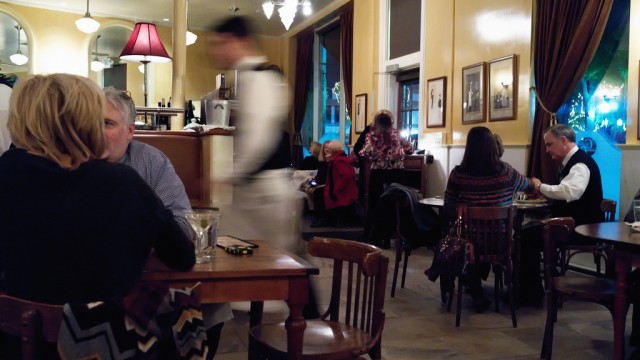Nearly a quarter million low-paid restaurant and hospitality workers who rely on tips could soon be getting raises.
A three-member wage board appointed by Gov. Cuomo to consider whether to increase the salaries of tipped workers will begin its work on Monday.
Made up of a business leader, labor union president and former county executive, the board is charged with reviewing regulations for food service workers and service employees, holding at least two public hearings, and recommending any needed changes.
Its recommendations will be sent to Cuomo’s labor commissioner, Peter Rivera, who has until no later than February to accept, revise or reject them.
Restaurant workers who earn tips are paid a minimum of just $5 an hour — a rate that was not increased when Cuomo and the Legislature last year agreed to raise the minimum wage in three phases to $9 an hour by the end of 2015. Other hospitality workers who earn tips make $5.65 an hour.
There are roughly 230,000 tipped workers in the state, with three quarters of them working in the restaurant industry, according to the 1 Fair Wage Coalition, which will hold rallies on the issue in the city and Albany on Monday.
Jose Sanchez, a 32-year-old Washington Heights Domino’s Pizza deliverer who says he makes $6.40 an hour, plans to attend Monday’s rally.
He says with tips, he makes as little as $250 a week, which makes it hard to always cover rent and other living expenses, let alone sending his older parents money from time to time.
“I’m not alone,” Sanchez said through a translator. “We can no longer depend on tips wages. I can’t sit around to wait to see how much tips I get, because the landlord is not going to wait.”
Michael Kink, executive director of the Strong Economy For All coalition, said Cuomo and Rivera “have an opportunity to boost the paychecks of thousands of New York’s lowest paid workers through this wage board.”
“Tipped workers aren’t second-class citizens and the law shouldn’t treat them like that,” Kink said.
By law, the tips an employee makes is supposed to help boost a worker’s pay to match or exceed the regular state minimum wage — something advocates complain often doesn’t happen.
The 1 Fair Wage Coalition wants tipped workers to make the same minimum wage as everyone else — a proposal that would be strongly opposed by businesses.
Made up heavily of women and minorities, restaurant workers have double the poverty rate of the workforce as a whole, said Paul Sonn, general counsel of the National Employment Law Project.
He said seven states already require that tipped workers get paid the full minimum wage.
Sonn said that raising the tipped-worker minimum wage to the same level as the regular minimum wage would not only be good policy, but also good politics for Cuomo as it would help him mend fences with the left wing of his party as he runs for reelection.
And Cuomo earlier this year, as part of a deal to win the union-backed Working Families Party nomination, agreed to push next year for another minimum wage increase and to allow localities like New York City to raise their own rates a certain percentage above the state rate.
While three statewide associations representing the restaurant and hospitality industries said they are ready to work with the governor and the wage board on the issue, they also warned that the hospitality and tourism industries in New York are crucial components of our economy.
A restaurant industry source doesn’t believe Cuomo will agree to match the rates, but fears he will try to appease the left by pushing through a significantly higher wage for tipped workers that the source says could hurt businesses and lead to employee layoffs.
“That’s certainly what we’re afraid of,” the restaurant industry source said.


